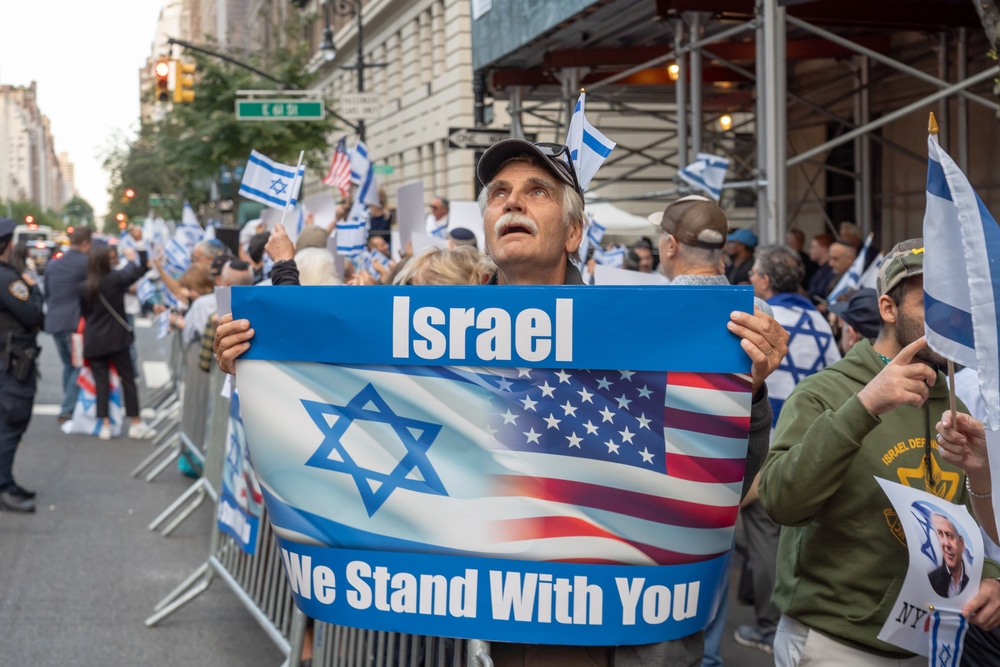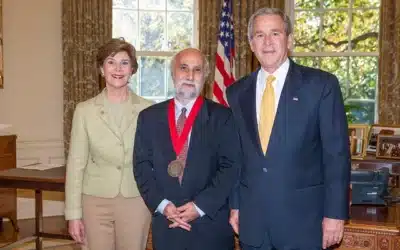Under the administration of President Joseph R. Biden, the U.S. government has been portraying itself as being seriously concerned about the humanitarian situation in the Gaza Strip, where Israel has been waging a devastating military assault that the International Court of Justice (ICJ) on January 26 judged to be a plausible genocide.
On March 3, Vice President Kamala Harris acknowledged the “devastating” situation in Gaza, where “starving” people are resorting to eating leaves and animal feed, women are giving birth to malnourished babies, and children are “dying from malnutrition and dehydration.” She drew loud applause for saying, “Given the immense scale of suffering in Gaza, there must be an immediate ceasefire.”
In his State of the Union Address on March 7, Biden proclaimed, “The United States has been leading international efforts to get more humanitarian assistance into Gaza.” He announced that the U.S. military would “lead an emergency mission to establish a temporary pier in the Mediterranean on the Gaza coast” so that humanitarian aid could be delivered by ship.
Biden also said that his administration had been “working non-stop to establish an immediate ceasefire” that would “ease the intolerable humanitarian crisis.”
“We have been very, very clear about our concerns over the humanitarian situation there and how unacceptable it is that so many people are in such dire need,” White House National Security Communications Advisor John Kirby told reporters.
But the reality is that the U.S. government has been fully supporting Israel’s military assault on the civilian population of Gaza, including by arming Israel and repeatedly blocking ceasefire resolutions in the United Nations (UN) Security Council aimed at enabling the delivery of urgently required humanitarian aid. Transparently, the Biden administration’s proclaimed desire to help the people of Gaza is a cynical public relations effort aimed at trying to create an illusion that the U.S. government is not complicit in Israel’s ongoing crimes against humanity.
The Biden administration is seeking to distance itself from responsibility for the humanitarian catastrophe because of the support he has been losing among members of his own Democratic Party, and with the ICJ already having judged the situation to be a plausible genocide, U.S. government officials are undoubtedly motivated by a desire to avoid potential future charges of complicity and failing in their own moral and legal obligation under the 1948 Genocide Convention to act to prevent genocide.
The Genocidal Intent of Israel’s Military Operation
In response to the atrocities perpetrated by Hamas militants against Israeli civilians on October 7, 2023, the Israeli government implemented a total siege of the Gaza Strip, which had already been under a crippling illegal blockade since 2006. The aim was to deny Gazans goods and services necessary for their survival, including food, water, electricity, and fuel—the latter of which was needed, among other things, to distribute humanitarian aid and run generators necessary to keep hospitals operational.
Meanwhile, the Israeli Defense Forces (IDF) began unleashing the most devastating bombardment the world has witnessed in the twenty-first century, dropping the equivalent of two nuclear bombs within just the first month and “generating destruction comparable in scale to the most devastating urban warfare in the modern record,” as The Wall Street Journal reported on December 30.
By then, about half of Gaza’s buildings, including nearly 70% of its housing units, had been damaged or destroyed. The Journal noted that the destruction “resembles that left by Allied bombing of German cities during World War II,” leaving “a landscape of crumpled concrete.”
From the start of the IDF’s “Operation Swords of Iron,” Israeli leaders were making public statements indicating openly genocidal intent. When the government of South Africa filed an application with the ICJ on December 29 accusing Israel of violating the 1948 Convention on the Prevention and Punishment of the Crime of Genocide, its 84-page document included several pages of quotations from Israeli leaders inciting genocide, including Prime Minister Benjamin Netanyahu, President Isaac Herzog, Defense Minister Yoav Gallant, National Security Minister Itamar Ben-Gvir, Energy and Infrastructure Minister Israel Katz, Finance Minister Bezalel Smotrich, and members of the Israeli military including Major General Ghassan Alian, the head of the Coordinator of Government Activities in the [Occupied] Territories (COGAT).
On October 9, Defense Minister Yoav Gallant declared, “I have ordered a complete siege on the Gaza Strip. There will be no electricity, no food, no fuel. Everything is closed. We are fighting human animals, and we are acting accordingly.” The next day, Gallant again described Palestinians as “human animals” while vowing, “Gaza won’t return to what it was before. We will eliminate everything.”
Head of COGAT Ghassan Alian likewise stated, “Human animals must be treated as such. There will be no electricity and no water, there will only be destruction. You wanted hell, you will get hell.”
IDF spokesperson Daniel Hagari said the Israeli military was “focused on what causes maximum damage.”
Former Head of Israel’s National Security Council Giora Eiland wrote in the Hebrew-language newspaper Yedioth Ahronoth that Israel should “make Gaza a place that is temporarily, or permanently, impossible to live in.” The IDF would not be content with blocking goods from entering but must “attack targets that provide these essential needs” because, he wrote, “Creating a severe humanitarian crisis in Gaza is a necessary means to achieve the goal.”
Israel threatened to bomb any humanitarian aid convoys attempting to enter Gaza from Egypt through the Rafah crossing, according to a report from Israel’s Channel 12 news on October 10. Two days later, a statement issued by dozens of UN independent experts affirmed that Israeli Defense Minister Yoav Gallant “threatened to bomb those attempting to provide humanitarian aid to the Gaza Strip.”
Since October, experts in international law and genocide studies, human rights organizations, and peace activists have been calling on the world to act urgently to prevent a genocide in Gaza.
On October 13, three Palestinian human rights organizations—Al-Haq, the Al Mezan Center for Human Rights, and the Palestinian Centre for Human Richts (PCHR)—published a joint statement calling on the world “to urgently intervene to protect the Palestinian people against a genocide.”
The same day, the organization Jewish Voice for Peace (JVP) issued a statement likewise calling on the world to stop “an unfolding genocide” in Gaza.
The Washington Post published an article by columnist Karen Attiah objecting to how the U.S. government was standing by and watching as Israel committed atrocities with openly “genocidal intent.”
The magazine Jewish Currents published an article by Raz Segal, an Israeli historian and Associate Professor of Holocaust and Genocide Studies at Stockton University in New Jersey, who similarly described the situation as “a textbook case of genocide.”
On October 14, the UN Special Rapporteur on the situation of human rights in the Palestinian territories occupied since 1967, Francesca Albanese, issued a statement reminding UN member states of their obligation to act “to prevent and protect populations from atrocity crimes,” referring to the situation in Gaza as at least constituting “ethnic cleansing”—which is included along with genocide and apartheid among what is known under international law as “crimes against humanity.”
On October 17, more than 800 scholars of international law, conflict studies, and genocide studies issued a statement warning of potential genocide in Gaza, citing numerous instances of Israeli leaders inciting genocide in conjunction with the observed effects of Israel’s observation on the ground.
The next day, the New York-based Center for Constitutional Rights published a paper documenting how Israel was “attempting to commit, if not actively committing, the crime of genocide” in Gaza.
The next day, seven UN experts issued a statement observing that the stated intentions of Israeli political leaders along with the observable effects of Israel’s military operation on the ground raised “a risk of genocide against the Palestinian people.”
U.S. Support for Israel’s Assault on Gaza’s Civilian Population
Despite the openly genocidal intent expressed by Israeli leaders, U.S. government officials expressed their full support for Israel’s actions.
The White House issued a statement on October 9 promising to “make sure Israel has what it needs” to execute its military operation. The next day, Defense Secretary Lloyd Austin, after assuring the U.S. government’s support in a meeting with Israeli Defense Minister Gallant, proclaimed that the IDF was “focused on the right things.”
Describing it as “a religious war,” Senator Lindsey Graham on Fox News urged the IDF to “Level the place!” Senator Tom Cotton similarly encouraged Israel to “bounce the rubble in Gaza”—an expression The New York Times explained as “a reference to a Winston Churchill quote about apocalyptic military overkill.” To that end, the U.S. government immediately moved to increase weapons shipments to Israel.
On October 18, the UN Security Council voted on a draft resolution calling for “humanitarian pauses” in the violence to allow delivery of aid to Gazans. Twelve members voted in favor, Russia and the United Kingdom (UK) abstained, and the United States used its veto power as a permanent member of the Council to block the resolution.
The same day, the White House issued a statement saying that it would provide aid to Palestinian civilians to “help support over a million displaced and conflict-affected people with clean water, food, hygiene support, medical care, and other essential needs.”
While fully supporting the Israeli military operation that had created the humanitarian crisis, the Biden administration requested Israel to relent slightly, and on October 21, two weeks into Operation Swords of Iron, the first trickle of aid was allowed to enter Gaza from Egypt through the Rafah crossing.
Having vetoed a resolution that would have legally required Israel to accommodate humanitarian aid operations on a sufficient scale to avert a humanitarian catastrophe, the Biden administration was fully aware that the amount of aid Israel started allowing in remained far below the amounts needed and that aid efforts remained hindered due to the risk from Israel’s continued bombardment of Gaza.
The U.S. government’s self-congratulatory actions are like a mugger stabbing someone in the back and then praising himself for calling an ambulance to take his victim to the hospital rather than letting the person bleed to death.
The Biden administration’s hypocrisy did not go unnoticed by the international community. Because of the absence of meaningful action by the Security Council, whose resolutions are legally binding on member states, the UN General Assembly on October 26 held a symbolic vote on a resolution calling for an immediate humanitarian ceasefire, which was adopted with 120 votes in favor, 45 abstentions, and 14 votes against. Among the member states voting nay, of course, were Israel and the United States.
Continued Warnings of a Genocide
While the United States was working to ensure the persistence of Israel’s brazen war crimes in Gaza, humanitarian organizations and legal scholars continued to call on the international community to act to prevent genocide.
On October 25, the United Kingdom-based aid organization Oxfam warned that Israel was using starvation as a weapon of war, noting that only a trickle of humanitarian aid was being allowed into Gaza, including what amounted to just 2% of the usual food deliveries that many Gazans were already dependent upon before Operation Swords of Iron due to Israel’s crippling 17-year illegal blockade, with 1.2 million people in Gaza already having been facing acute food insecurity.
On October 28, the Director of the New York Office of the UN High Commissioner for Human Rights, human rights lawyer Craig Mokhiber, published a letter of resignation in protest of what he joined Israeli historian Raz Segal in describing as “a text book case of genocide.”
On October 29, UN Special Rapporteur Francesca Albanese gave an interview describing “a humanitarian catastrophe of epic proportions,” a situation “beyond disaster” that was occurring in the context of “the genocidal calls that are dominant in Israel at this point.”
On November 2, eight UN independent experts warned that time was running out to avoid an absolute humanitarian catastrophe in Gaza and called on the world to act to prevent a genocide.
On November 5, the Geneva-based organization Euro-Mediterranean Human Rights Monitor issued a statement calling on the world to stop “an imminent explosion in child deaths” due to Israel’s “war of starvation against civilians in the Gaza Strip.”
On November 10, The New York Times published an opinion article by Omer Bartov, an Israeli-born professor of Holocaust and genocide studies at Brown University in Providence, Rhode Island, who cited the “genocidal intent” of Israeli leaders while calling on the U.S. government, without a moment to lose, “to stop Israel from letting its actions become a genocide.”
On November 13, a lawsuit was filed by Palestinian plaintiffs against President Joe Biden, Secretary of State Antony Blinken, and Secretary of Defense Lloyd Austin for failing in their obligation under the 1948 Genocide Convention to prevent acts of genocide. The lawsuit included the testimony of three scholars of genocide and Holocaust studies expressing their conclusion that what was occurring in Gaza was possibly a genocide.
On November 16, dozens of UN independent experts issued a statement warning about “the risk of genocide in Gaza” and expressing concern about “the failure of the international system to mobilize to prevent genocide.”
On November 18, Euro-Mediterranean Human Rights Monitor issued a statement describing Israel’s military operation as a “genocide campaign.”
On November 19, Oxfam issued another statement condemning Israel’s use of starvation as a weapon of war and calling on the UN Security Council to act immediately to secure a ceasefire so that desperately needed humanitarian aid could be delivered.
The same day, the United Nations warned that its entire humanitarian aid operation was at risk of shutting down due to Israel’s continued blockade of fuel.
On December 2, the UN Humanitarian Coordinator for the Occupied Palestinian Territory, Lynn Hastings, said that “The conditions required to deliver aid to the people of Gaza do not exist.”
On December 5, UN Emergency Relief Coordinator Martin Griffiths warned that there was no meaningful humanitarian operation in Gaza because of the continued siege and bombardment, resulting in a situation on the ground that he described as “apocalyptic.”
By early December, half the population of Gaza was starving, according to the UN World Food Programme (WFP).
The Biden Administration’s Persistent Complicity in Gaza’s Humanitarian Catastrophe
In the face of the global outcry against the humanitarian catastrophe in Gaza and calls for an immediate ceasefire to enable the existence of meaningful aid operations, the U.S. government doubled down on its complicity in Israel’s atrocity crimes.
On December 8, the UN Security Council voted on a draft resolution calling for an “immediate humanitarian ceasefire.” There were thirteen votes in favor, the United Kingdom abstained, and the United States vetoed it.
The international independent medical humanitarian organization Médecins Sans Frontières (MSF), or Doctors without Borders, criticized the U.S. veto as “a vote against humanity.” Human Rights Watch (HRW) criticized the U.S. government’s use of its veto on two occasions to block “resolutions aimed at stopping mass atrocities.” In mid-December, HRW issued a statement condemning Israel’s deliberate use of starvation as a weapon of war in Gaza.
On December 12, President Joe Biden conceded that Israel was engaged in “indiscriminate bombing” in Gaza, which is by definition a war crime. But that admission didn’t stop him from reassuring Israel that the U.S. would continue to support its actions in Gaza unconditionally.
Israel’s admittedly indiscriminate bombing included dropping over 200 U.S.-provided Mark-84 2,000-pound bombs on the densely populated Gaza Strip by December 21, according to a New York Times investigation. This included 2,000-pound bombs dropped on the most densely populated area in Gaza, the Jabaliya refugee camp.
The reality that the United States was enabling Israel to perpetrate atrocity crimes with the whole world watching began causing the Biden administration a public relations problem, particularly given an upcoming presidential election. There was a political need for the White House to be able to say that it was working to ensure the delivery of humanitarian aid into Gaza while acting to help cause the humanitarian catastrophe.
The Biden administration therefore successfully convinced the Israeli government to open the Kerem Shalom crossing on December 16 to enable entry of humanitarian aid into Gaza from southern Israel, in addition to aid entering from Egypt via the nearby Rafah crossing.
This, too, was just for show, as the Biden administration evidently persuaded the Netanyahu government as Israel was committing war crimes right up to the very limit of what was politically feasible. The message that the Biden administration delivered unambiguously to the Israeli government was simple: You have to at least make an effort not to appear as intending to perpetrate genocide.
Reinforcing the message with a wink and a nod, the Biden administration at the end of December bypassed Congress for a second time to approve “emergency” weapons sales to Israel to facilitate its military assault on the civilian population of Gaza.
On December 29, when South Africa filed its application with the ICJ, also known as the World Court, it called on the court to order preliminary measures to protect the Palestinian people in Gaza. The civilian population could not wait for the many months it would take for the court to deliberate and come to a final determination about whether Israel is committing genocide, South Africa argued; it was sufficient to show that there is a plausible case that Israel is violating the Genocide Convention to trigger preliminary measures from the court.
The response from the Biden administration to South Africa’s application was to offhandedly dismiss it. “We find this submission meritless, counterproductive, and completely without any basis in fact whatsoever,” said White House National Security Communications Advisor John Kirby at a press briefing on January 3.
The world’s most authoritative source on the interpretation and application of international law, however, did not agree with the White House’s unserious response. On January 26, the ICJ ruled that the nature of Israel’s assault on Gaza did amount to a “plausible” genocide.
The court hence ordered Israel to take all measure within its power to prevent acts falling within the scope of the Genocide Convention, including the killing of Palestinians, causing serious bodily or mental harm to Palestinians, deliberately inflicting conditions of life calculated to bring about the physical destruction of Gazans as a people in whole or in part, and imposing measures in Gaza intended to prevent births.
The court further ordered Israel to take all measures within its power to prevent public incitement to genocide and to punish individuals responsible for making statements inciting genocide.
Israel’s apologists have highlighted the fact that South Africa asked the ICJ to order Israel to completely cease its military operation and that the ICJ did not do so. But in effect, it did, because the court also ordered Israel to take immediate and effective measures to enable the provision of urgently needed humanitarian aid to Gazans—and there had been a chorus among international human rights and humanitarian aid groups for several months about the impossibility of delivering and distributing aid on the scale required in the absence of a ceasefire.
It was in this context that the U.S. government on February 20 once again vetoed a ceasefire resolution in the UN Security Council, which was the third time that the Biden administration had blocked a resolution calling for a ceasefire to enable the delivery of humanitarian aid desperately needed to prevent mass death on a scale beyond what Israel had already achieved through its indiscriminate bombing.
Once again, the international community expressed outrage about Washington’s use of its veto in a way that helped ensure the persistence of the humanitarian catastrophe.
The organization Médecins Sans Frontières (MSF), or Doctors Without Borders, called the United States’ veto “unconscionable.” The United States was “sabotaging all efforts to bring assistance” to the population of Gaza while pretending to be concerned about consequences. As noted by the group’s executive director, Avril Benoit, “The statements are one thing, the actions are another.”
Numerous UN agencies, including the WFP, continued warning of imminent famine in Gaza. In an implicit message primarily aimed at Washington, dozens of UN independent experts issued a statement calling for arms exports to Israel to immediately stop. The experts reminded states of their own legal obligation not to provide arms to Israel when there was such a “clear risk” that they’d be used to violate international law.
As Jeremy Scahill observed in The Intercept with respect to the continued arms flow from Washington:
There is no Israeli war crime too extreme for Joe Biden to consider pausing, to say nothing of cutting off, the flow of U.S. weapons and financial support for Israel’s war of annihilation…A recent U.S. intelligence estimate indicated that Israel’s current weapons stockpiles only enables it to wage war against Gaza for an additional 19 weeks, unless Washington sends more ammunition. The fact that Biden has outright refused to use his leverage as Israel’s arms dealer is a stark indication that the occasional public platitudes, offered by U.S. officials and numerous media leaks about Biden’s mounting frustration with Netanyahu, are little more than a re-election campaign ploy.
Indeed, President Biden was coming under increasing pressure domestically to use its considerable leverage to pressure Israel to stop committing war crimes overtly. The political cost of ardently supporting Israel’s onslaught was becoming clear in Michigan, where opposition among Democrats portended an election loss.
While Washington was busy pretending to care about the lives of Palestinian civilians at the same time it was blocking UN ceasefire resolutions, defunding the main UN aid agency in Gaza, and providing Israel with weapons it was using to perpetrate war crimes, the United Nations reported that the amount of aid allowed into Gaza in February was half the amount delivered in January.
Providing yet another illustration of how Israel was violating the ICJ’s order to comply with the Genocide Convention, the UN also reported that newborn babies were dying in Gaza because Israel’s assault was preventing pregnant women from getting the nutrition and health care required for successful births.
Children in Gaza were beginning to die from malnutrition and dehydration, literally starving to death. According to the UN Office for the Coordination of Humanitarian Affairs (OCHA), one in four Gazans faced “catastrophic levels of food insecurity” as a result of Israel’s policy of deliberately starving the population.
On March 2, because Biden was “under political pressure to do more to help the Palestinians even as the U.S. supplies Israel with military hardware,” as The New York Times noted, the U.S. military began airdropping humanitarian aid into Gaza in a joint operation with the Jordanian Air Force, which had already begun airdropping food as an act of humanitarian desperation given Israel’s ongoing U.S.-backed siege.
The international human rights and humanitarian aid community appropriately scoffed at what, for the part of the Biden administration, amounted to a hypocritical public relations stunt.
“Airdrops do not and cannot substitute for humanitarian access,” criticized the International Rescue Committee, a New York-based aid group, which further described it as a distraction from serious efforts.
A former director of the U.S. Agency for International Development (USAID), Dave Harden, pointed out that “there will be no meaningful humanitarian impact in Gaza” from the airdrops.
After the IDF turned back a WFP convoy aiming to deliver food into northern Gaza and Jordan airdropped supplies there, WFP Deputy Executive Director Carl Skau emphasized, “Airdrops are a last resort and will not avert famine.”
When the Biden administration announced its plan to additionally construct a floating pier to deliver aid to Gaza by ship, which was anticipated to take a month or two to complete at a cost of roughly tens of millions of dollars, the hypocrisy was so glaring that even mainstream media outlets typically serving to manufacture consent for the government’s policy of supporting Israel’s crimes against the Palestinians could not fail to perceive it.
As a Washington Post headline noted, “U.S. floods arms into Israel despite mounting alarm over war’s conduct.” The article reported that the government had “quietly approved and delivered more than 100 separate foreign military sales to Israel” since the start of its military assault on Gaza, which amounted to “a massive transfer of firepower at a time when senior U.S. officials have complained that Israeli officials have fallen short on their appeals to limit civilian casualties, allow more aid into Gaza, and refrain from rhetoric calling for the permanent displacement of Palestinians.”
A New York Times headline similarly observed, “Providing Both Bombs and Food, Biden Puts Himself in the Middle of Gaza’s War.” As the Times put it, the administration’s schizophrenia “raised uncomfortable questions about America’s role.”
Yousef Munayyer, the head of the Palestine-Israel program at Arab Center Washington, told the Times, “It doesn’t make any sense. It’s akin to showing up at a five-alarm fire with a cup of water while giving fuel to the arsonist. The administration is trying to deal with a political problem, which is the optics of supporting this horrific war with these cosmetic measures that are aimed at defusing some voter anger.”
Referring to airdrops and the pier plan, the president of the International Rescue Committee, David Miliband, said, “All of these should not divert attention from the material evidence that only a cease-fire will provide the civilian protection, aid flows, repair of infrastructure and public health measures that are so needed. Fourth- and fifth-best solutions should not be normalized as effective alternatives to better solutions.”
Doctors Without Borders issued a statement calling the pier plan a “glaring distraction” from what was really needed: “The food, water, and medical supplies so desperately needed by people in Gaza are sitting just across the border. Israel needs to facilitate rather than block the flow of supplies.”
“This maritime initiative in no way takes the obligations away from Israel as the occupying power to fully open up the land crossings and allow unhindered humanitarian access,” noted Chris Gunness, a former spokesperson for the UN Relief and Works Agency (UNRWA), the key agency responsible for delivering humanitarian aid into Gaza. A sustainable aid operation, he added, would require a “stable and credible ceasefire”—which the United States had worked to prevent with its veto power in the Security Council.
On March 3, the Freedom Flotilla Coalition, a grassroots solidarity movement that has previously organized aid flotillas aimed at ending Israel’s illegal blockade of Gaza, including a convoy that came under a murderous attack by Israeli forces in international waters on May 31, 2010, issued a scathing indictment of the U.S. government’s hypocrisy:
The U.S.-led “sea corridor” to Gaza and the current “temporary pier” proposal are cynical distractions from U.S. complicity in Israel’s ongoing genocide, including the deliberate starvation of over 2 million Palestinian civilians. The U.S. and its allies continue to arm and support Israel’s bombardment, displacement and denial of the necessities of life of Palestinian people in Gaza and they refuse to exert the political pressure necessary to compel Israel to end its aggression. The humanitarian needs in Gaza are enormous, but delivery of aid is not primarily a logistics problem. Proven channels for delivering aid to Gaza exist, but Israel has all but shut them down—long lines of aid trucks have been waiting at the Rafah crossing for months. The “banned” items which Israel uses as excuses to reject entire shipments include anesthetics and birthing medical equipment. Emergency amputations and Caesarean sections are being endured without anesthesia in Gaza. Rather than continuing to arm Israeli aggression against Gaza, the US must pressure Israel to comply with international law, end its siege and allow in all necessary shipments at the same rate as before October 2023—at least 500 truckloads per day.
…Public relations measures like air drops are clearly insufficient, and sometimes lethal. A sea corridor and temporary pier controlled by the US with aid inspected by Israel are at best distractions from the ongoing genocide, and the lack of political will to end it.
The coalition announced that preparations were underway to send another flotilla to Gaza carrying humanitarian aid and the message of solidarity with the Palestinians in their yearning for freedom from Israel’s murderously oppressive rule.
The objections to the Biden administration’s support for Israel’s months-long assault on the civilian population of Gaza coming from within his own political party have created a public relations problem for the White House during an election year, but American voters should not delude themselves into the belief that the U.S. government is a part of the solution rather than a part of the problem. The American people have the power to change the course of history for the better, but they have to actually use it. A simple first step would be to recognize that there are certain positions that ought to automatically disqualify a presidential candidate from consideration—and supporting a genocide is certainly one of them.
If upholding basic moral values this way rules out all three of the top contenders in the presidential race—Joe Biden, Donald Trump, and Robert F. Kennedy, Jr.—then so be it.
































